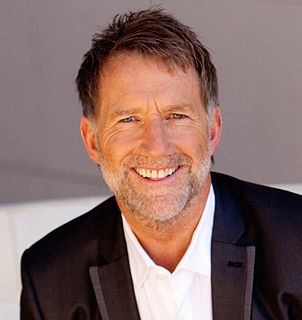A Quote by Blaise Pascal
Without the knowledge of our wretchedness, the knowledge of God creates pride. With it, the knowledge of God creates despair. The knowledge of Christ offers a third way, because in him we find both God and our wretchedness.
Related Quotes
The Christian religion, [Pascal] claims, teaches two truths: that there is a God who men are capable of knowing, and that there is an element of corruption in men that renders them unworthy of God. Knowledge of God without knowledge of man's wretchedness begets pride, and knowledge of man's wretchedness without knowledge of God begets despair, but knowledge of Jesus Christ furnishes man knowledge of both simultaneously.
The man who knows God but does not know his own misery, becomes proud. The man who knows his own misery but does not know God, ends in despair...the knowledge of Jesus Christ constitutes the middle course because in him we find both God and our own misery. Jesus Christ is therefore a God whom we approach without pride, and before whom we humble ourselves without despair.
Now I wonder what our knowledge has in common with God's knowledge according to those who treat God's knowledge... Is there anything else common to both besides the mere name? ...there is an essential distinction between His knowledge and ours, like the distinction between the substance of the heavens and that of the earth.
We should not be content to say that power has a need for such-and-such a discovery, such-and-such a form of knowledge, but we should add that the exercise of power itself creates and causes to emerge new objects of knowledge and accumulates new bodies of information. ... The exercise of power perpetually creates knowledge and, conversely, knowledge constantly induces effects of power. ... It is not possible for power to be exercised without knowledge, it is impossible for knowledge not to engender power.
The true bounds and limitations, whereby human knowledge is confined and circumscribed,... are three: the first, that we do not so place our felicity in knowledge, as we forget our mortality: the second, that we make application of our knowledge, to give ourselves repose and contentment, and not distates or repining: the third, that we do not presume by the contemplation of Nature to attain to the mysteries of God.
Without knowledge of self there is no knowledge of God Our wisdom, in so far as it ought to be deemed true and solid Wisdom, consists almost entirely of two parts: the knowledge of God and of ourselves. But as these are connected together by many ties, it is not easy to determine which of the two precedes and gives birth to the other.
In order to the attaining of all useful knowledge this is most necessary, that we fear God; we are not qualified to profit by the instructions that are given us unless our minds be possessed with a holy reverence of God, and every thought within us be brought into obedience to Him.... As all our knowledge must take rise from the fear of God, so it must tend to it as its perfection and centre. Those know enough who know how to fear God, who are careful in every thing to please Him and fearful of offending Him in any thing; this is the Alpha and Omega of knowledge.
On the basis of the eternal will of God we have to think of EVERY HUMAN BEING, even the oddest, most villainous or miserable, as one to whom Jesus Christ is Brother and God is Father; and we have to deal with him on this assumption. If the other person knows that already, then we have to strengthen him in the knowledge. If he does no know it yet or no longer knows it, our business is to transmit this knowledge to him.
The endless cycle of idea and action, Endless invention, endless experiment, Brings knowledge of motion, but not of stillness; Knowledge of speech, but not of silence; Knowledge of words, and ignorance of the Word. All our knowledge brings us nearer to our ignorance, All our ignorance brings us nearer to death, But nearness to death no nearer to God. Where is the Life we have lost in living? Where is the wisdom we have lost in knowledge? Where is the knowledge we have lost in information? The cycles of Heaven in twenty centuries Bring us farther from God and nearer to the Dust.







































